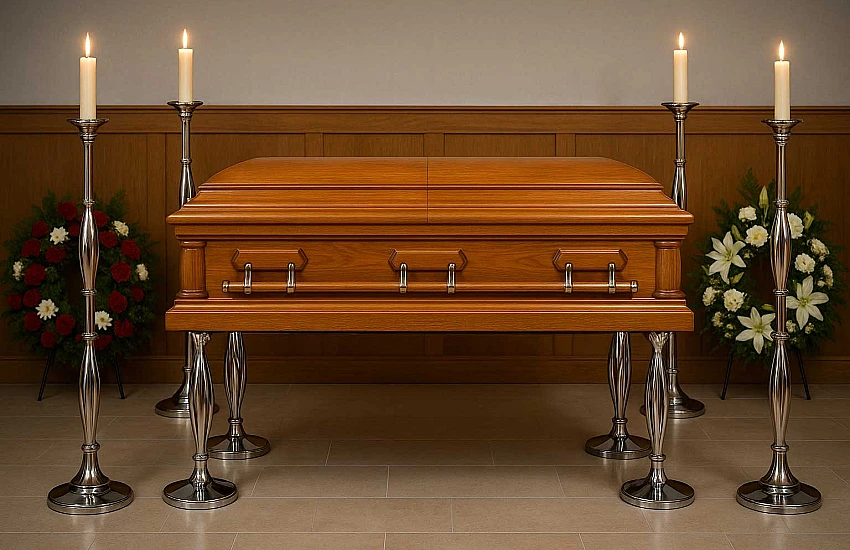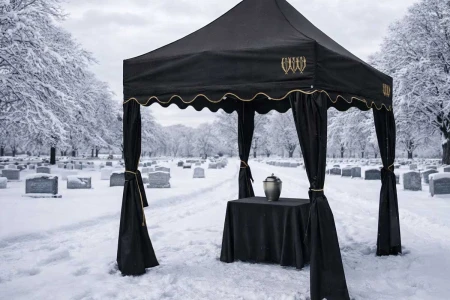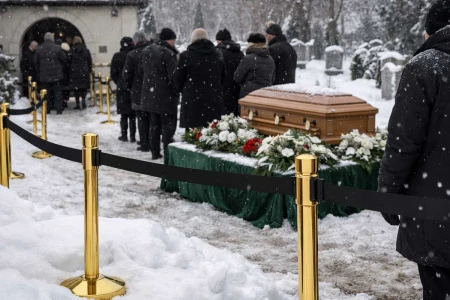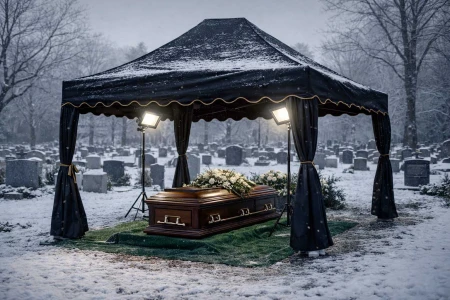Table of Contents
- The Significance of Coffin Stands in Funeral Ceremonies
- Types of Catafalques Available in the Funeral Market
- Key Features of a Good Coffin Stand
- Materials and Manufacturing Technologies for Catafalques
- Safety Aspects
- Practical Guidelines for Catafalque Selection
- Maintenance and Care of Coffin Stands
- funeraryaccessories.com Store Offer – Professional Highest Quality Catafalques
- Frequently Asked Questions (FAQ)
- Summary – Investment in Funeral Ceremony Dignity
In the funeral industry, every detail matters. The dignity of a funeral ceremony depends not only on the proper conduct of the liturgy and funeral speeches, but also on professional equipment that creates the appropriate atmosphere for farewell. One of the most important elements of this equipment is coffin stands, also known as funeral catafalques. These specialized structures play a key role in organizing funeral ceremonies, providing not only practical support but also emphasizing the solemnity and dignity of the final farewell.
A catafalque is a special elevated construction designed for placing a coffin or urn during funeral ceremonies. The name derives from the French word "catafalque," which historically referred to an ornate bed or platform used for displaying the remains of the deceased during mourning ceremonies. Modern catafalques have retained their original purpose but have been adapted to meet the contemporary needs of funeral homes and religious institutions.
The Significance of Coffin Stands in Funeral Ceremonies
The role of catafalques in organizing funeral ceremonies extends far beyond simply supporting the coffin. These specialized constructions serve several important functions that affect both the practical aspects of the ceremony and its emotional and spiritual dimensions.
First and foremost, coffin stands ensure proper display of the coffin during ceremonies. Elevating the coffin to an appropriate height allows all ceremony participants better visibility, which is particularly important in larger churches or chapels. This enables every mourner to participate dignifiedly in the final farewell, regardless of their location.
Funeral catafalques also serve a symbolic function. Raising the coffin above floor level emphasizes the uniqueness of the moment and expresses respect for the deceased. In many cultures and religious traditions, elevation has deep spiritual meaning, symbolizing the soul's journey toward heaven or its elevation above earthly matters.
From a practical standpoint, good coffin stands also facilitate the work of funeral services. The appropriate height of coffin placement ensures ceremonies can proceed smoothly, without the need for additional manipulations or awkward movements. This is particularly important during ceremonies involving many priests, deacons, or other ceremonial officials.
Modern catafalques are also designed with ceremony participant safety in mind. Stable construction ensures the coffin remains securely positioned throughout the ceremony, eliminating the risk of unforeseen situations that could disturb the ceremony's solemnity or threaten attendee safety.

Types of Catafalques Available in the Funeral Market
The funeral equipment market offers a wide selection of catafalques adapted to various needs and specificities of funeral ceremonies. Understanding the differences between various types of coffin stands is crucial for making the right choice that will serve for years and meet the expectations of both professionals and clients.
- Fixed catafalques represent the most traditional category of this equipment. They feature solid, non-separable construction that ensures maximum stability and durability. These models are most often chosen by churches and chapels that have permanent space designated for storing such equipment. Fixed catafalques are available in both wooden and metal versions, often decorated with additional ornamental elements that emphasize the ceremonial character of the ceremony.
- Folding catafalques are a modern solution gaining increasing popularity among funeral homes. Their main advantage is the ability to easily fold and unfold, which significantly facilitates transport and storage. Folding models are particularly useful for companies organizing ceremonies in various locations, as they can be easily transported between churches, chapels, or other ceremony venues. Despite their folding capability, they do not compromise on stability and safety compared to fixed models.
- Catafalque trolleys are specialized constructions combining the function of a stand with transport capability. Equipped with appropriately designed wheels, they enable smooth movement of the coffin between different ceremony points. They are particularly useful during ceremonies that include several stages in different locations, such as a mass in church followed by cemetery ceremonies.
- Universal catafalques are models designed to accommodate both coffins and urns. This flexibility makes them ideal for funeral homes serving different types of funeral ceremonies. Universal coffin stands are often equipped with adjustable elements that allow adaptation of the construction to different coffin or urn sizes.
Key Features of a Good Coffin Stand
Selecting an appropriate catafalque requires considering many factors that affect the quality, functionality, and durability of this equipment. A good coffin stand should combine construction solidity, aesthetics, functionality, and usage safety.
- Construction stability is the most important feature of any catafalque. The stand must be able to safely support the weight of the coffin along with the deceased's body, which can reach 200-300 kilograms. A solid base, appropriately distributed support points, and proper construction proportions ensure the catafalque remains stable even with uneven weight distribution. Well-designed coffin stands also account for possible slight movements or vibrations that may occur during ceremonies without losing stability.
- Materials used in catafalque production directly impact its durability and aesthetics. Stainless steel is the material most often chosen by professionals due to its strength, corrosion resistance, and ease of maintenance. Steel catafalques can serve for decades while maintaining their original appearance and functionality. Wood, particularly hardwood species like oak or beech, offers natural beauty and elegance but requires appropriate care and moisture protection.
- Usage ergonomics is another important aspect of a good coffin stand. The catafalque height should be adapted to the average height of ceremony attendants to enable comfortable placement and possible movement of the coffin. Optimal working height typically ranges from 70-90 centimeters, though some models offer height adjustment capability.
- Catafalque aesthetics affects the overall character of the funeral ceremony. A good coffin stand should feature elegant but restrained design that doesn't distract attention from the ceremony's main focus. Classic lines, subdued colors, and high-quality finishing ensure the catafalque harmoniously fits with the funeral ceremony's solemn character.
- Additional functionality can significantly increase the catafalque's utility value. Models equipped with adjustable legs allow perfect leveling even on uneven surfaces. Additional handles facilitate transport and manipulation, especially for folding models. Some coffin stands also offer additional shelves or compartments for flowers, candles, or other ceremony elements.

Materials and Manufacturing Technologies for Catafalques
The choice of material for catafalque production is crucial for its long-term functionality and aesthetics. Contemporary production technologies enable creating coffin stands from various materials, each offering specific advantages and potentially optimal for particular applications.
- Stainless steel dominates the professional catafalque segment due to its exceptional properties. Corrosion resistance ensures steel stands can be used both indoors and outdoors without fear of material degradation. Stainless steel is also very hygienic – its smooth surface doesn't absorb odors or contaminants, and cleaning is simple and effective. Modern welding and surface treatment techniques allow creating steel catafalques with very aesthetic appearance, with the possibility of achieving various textures and surface finishes.
- Aluminum gains popularity as a material for producing lightweight yet durable catafalques. Aluminum alloys offer excellent strength-to-weight ratio, making them ideal for producing folding coffin stands intended for frequent transport. Aluminum catafalques are corrosion-resistant, easy to maintain, and can be anodized in various colors, allowing aesthetic adaptation to specific requirements.
- Wood remains a popular material, particularly in traditional churches and chapels, where the natural beauty of this material harmonizes with historical architecture. Wooden catafalques are most often made from hardwood species such as oak, beech, or elm, which feature high strength and beautiful grain structure. Modern wood treatment techniques, including lacquering and impregnation, significantly increase wooden coffin stand durability and their resistance to moisture or pests.
- Composite materials are a modern solution combining advantages of various traditional materials. Wood-polymer composites offer wood aesthetics while providing weather resistance comparable to synthetic materials. They are particularly useful for catafalques intended for outdoor use or in high-humidity conditions.
Safety Aspects
Safety in catafalque usage is of paramount importance, particularly in the context of funeral ceremonies where every element should proceed smoothly and problem-free. Quality coffin stands must meet rigorous safety standards and undergo appropriate strength testing.
- Strength standards for catafalques specify minimum loads that the construction must be able to safely support. Standard requirements provide for a load capacity of at least 300-400 kilograms, with an appropriate safety factor accounting for dynamic loads that may occur during coffin placement or movement. The best coffin stands undergo load testing exceeding even twice their declared working capacity.
- Usage stability is tested in various load configurations, accounting for possible uneven coffin weight distribution. Tests also include simulation of usage conditions on uneven surfaces to ensure the catafalque remains stable even in suboptimal conditions.
- Connection quality and folding mechanisms are particularly important for folding catafalque models. All latches, locks, and folding points must be designed with a large safety margin and undergo cyclical testing simulating repeated folding and unfolding over extended usage periods.

Practical Guidelines for Catafalque Selection
The process of selecting an appropriate coffin stand should consider the specifics of the usage location, ceremony frequency, and specific institutional requirements. A practical approach to this decision will help ensure optimal functionality and long-term purchase satisfaction.
- Space analysis is the first step in the selection process. Precise measurement of available space is necessary, considering not only the catafalque dimensions but also space needed for safe maneuvering around it during ceremonies. For churches and chapels, it's also important to consider ceiling height and storage possibilities for folding models.
- Usage frequency directly impacts catafalque type selection. Institutions organizing ceremonies daily or several times weekly should focus on models with highest durability, even if they require larger initial investment. For locations with occasional use, more economical models with simpler construction but still ensuring basic functionality may be more suitable.
- Mobility and transport are important factors for funeral homes organizing ceremonies in various locations. Folding coffin stands with lightweight construction but full functionality will be the best choice. It's worth noting models equipped with convenient transport bags or cases.
- Compatibility with interior design may seem like a secondary aspect but has great significance for the ceremony's overall impression. Classic wooden catafalques harmonize perfectly with traditional church interiors, while modern steel constructions may be more appropriate in contemporary chapels or crematoria.
- Budget and long-term investment profitability require a balanced approach. While the most expensive models often offer the best quality and durability, excellent solutions also exist in medium price ranges that will provide years of reliable service at significantly lower initial cost.
Maintenance and Care of Coffin Stands
Proper catafalque maintenance is crucial for preserving their functionality, safety, and aesthetics over many years of use. Regular care not only extends coffin stand lifespan but also ensures they always present dignifiedly during funeral ceremonies.
- Daily cleaning should include dust removal and possible contaminants from the catafalque surface. For steel models, wiping with a soft, dry cloth is sufficient, possibly slightly dampened with water and mild detergent. Wooden coffin stands require gentler treatment – specialized wood care products should be used that not only clean but also nourish the material.
- Periodic technical inspections are essential for ensuring usage safety. At least once monthly, all screw connections, folding mechanisms, and general construction stability should be checked. Particular attention should be paid to load points and areas subject to greater wear, such as catafalque legs or support surfaces.
- Lubrication of moving parts in folding catafalque models should be performed according to manufacturer recommendations, usually every 3-6 months depending on usage intensity. Only the recommended grease type should be used that won't negatively affect construction materials or cause contamination accumulation.
- Storage of folding coffin stands should occur in dry, ventilated rooms protected from direct sunlight. Wooden models are particularly sensitive to humidity fluctuations, which can cause material swelling or shrinking.
- Repairs and part replacement should only be performed by qualified personnel or authorized service centers. Self-repairs may not only worsen the catafalque condition but also affect its usage safety.

funeraryaccessories.com Store Offer – Professional Highest Quality Catafalques
The funeraryaccessories.com store distinguishes itself in the funeral accessories market through its rich offer of high-quality catafalques designed with funeral industry professional needs in mind. The offer includes a wide range of coffin stands, from classic fixed models to modern folding constructions, all made from the finest materials and maintaining the highest quality standards.
Catafalque Type P – Modern Folding Solution
The Type P funeral catafalque is a modern solution combining stability, elegance, and functionality in one construction. This folding coffin stand made from chrome-plated steel offers exceptional mobility through folding wings and compact construction when folded. Four folding wings enable adaptation of the catafalque to different coffin dimensions, while anti-slip pads provide additional stability during ceremonies. Chrome finish gives this model an elegant appearance ideal for ceremonial occasions, and the smooth surface facilitates cleanliness maintenance. Type P catafalque is particularly valued by funeral homes for its storage and transport ease while maintaining full functionality.
Catafalque Type C – Low Version
The Type C funeral catafalque in low version is a reliable coffin elevation that combines steel construction strength with elegant chrome finish. This model consists of two identical elements measuring 40 x 48 x 39 cm each, which can be stacked, significantly facilitating storage and transport. When folded, the catafalque occupies only 40 x 48 x 3 cm of space. Maximum load of 350 kg ensures safety and stability in every situation, while the chrome surface is stain-resistant and easy to maintain hygienically. Solid steel construction guarantees product longevity, making it a reliable solution for funeral homes valuing quality and functionality.
Catafalque Type C – High Version
The Type C funeral catafalque in high version provides an ideal solution for ceremonies requiring greater coffin display. Like the low version, it's made from high-quality chrome-plated steel and consists of two solid elements enabling easy storage and transport. Maximum load capacity also equals 350 kg, ensuring safety during high-ranking ceremonies. The elegant appearance of chrome finish excellently complements funeral ceremony solemnity, while the stain-resistant surface enables quick and simple maintenance. This model is particularly valued in larger churches and chapels where greater height ensures better visibility for all ceremony participants.
Catafalque No. 5 – Elegance with Personalization Option
The catafalque from set No. 5 is a solid and aesthetic chapel equipment element made in Poland with highest attention to detail. Steel construction covered with durable powder coating ensures resistance to mechanical damage and atmospheric factors. Compact dimensions of 57.5 x 57.5 cm make it ideal for smaller chapels while maintaining full stability and functionality. A unique feature of this model is color personalization possibility – the catafalque can be made in a wide color spectrum, allowing perfect adaptation to chapel décor. Universal design elegantly complements any interior style, and precise execution guarantees many years of reliable service.
Catafalque No. 4 – Larger Dimensions for Demanding Ceremonies
The catafalque from set No. 4 is a Polish-made product combining high execution quality with aesthetic design adapted to larger ceremonies. Dimensions of 74 x 60 cm provide greater support surface, ideal for high-ranking ceremonies. Steel construction painted with powder method is resistant to mechanical damage and atmospheric conditions, guaranteeing product longevity. Like model No. 5, it offers custom color execution possibility, allowing adaptation to individual chapel needs. Production time is 3-7 working days, enabling even urgent order fulfillment while maintaining highest execution quality.
Catafalque No. 6 – Natural Wood Beauty
The chapel catafalque from set No. 6 is a unique equipment element combining natural wood beauty with modern powder coating durability. This wooden coffin stand measuring 150 x 55 x 70 cm is made from solid wooden construction covered with very durable lacquer resistant to damage and atmospheric factors. Natural wood appearance combined with modern lacquering ensures the catafalque harmonizes perfectly with traditional chapel décor, creating a dignified and respectful background for farewell ceremonies. The 150 cm length provides appropriate surface for various coffin sizes, while 70 cm height guarantees optimal display. The product is made to order in Poland within 3-7 working days.
All catafalques available in the funeraryaccessories.com store feature quick order fulfillment capability. Some models are available immediately from stock, allowing instant delivery, while special models are made to order within 3-5 working days. This organization allows flexible response to customer needs regardless of order urgency.
Material quality used in catafalque production offered by funeraryaccessories.com is carefully controlled at every production stage. Stainless steel comes from renowned suppliers and meets the highest corrosion resistance standards. Wood is sourced from certified sources and undergoes special drying and stabilization processes. All auxiliary elements such as screws, hinges, or wheels come from proven industrial component manufacturers.
Usage ergonomics is one of the priorities when designing catafalques offered by the store. Working height is optimized for average height of ceremony attendants, ensuring comfortable and safe usage. Additional handles and auxiliary elements are positioned to facilitate manipulation and transport, especially for folding models.
Aesthetics of offered coffin stands has been designed considering diverse customer aesthetic needs. Classic lines and subdued colors work well in both traditional church interiors and modern chapels or crematoria. The possibility of choosing different surface finishes allows perfect adaptation to specific interior décor.
Technical support and consultation offered by funeraryaccessories.com store helps customers select optimal solutions. Experienced consultants consider usage location specifics, ceremony frequency, and customer budget to propose the best solution. Telephone or email consultation possibility ensures professional support at every purchase process stage.
Warranty and after-sales service are elements that distinguish funeraryaccessories.com store offer from competition. All catafalques are covered by multi-year manufacturer warranty covering both materials and workmanship. In case of repair needs or part replacement, the store provides quick and professional service.

Frequently Asked Questions (FAQ)
What is the optimal catafalque height for average users?
Optimal catafalque working height should range from 75-85 centimeters, corresponding to average height of funeral ceremony attendants. This height ensures comfortable coffin access without excessive bending or reaching overhead. Many modern models offer height adjustment capability within several centimeters, allowing ideal adaptation to specific user needs. When choosing height, ceremony character should also be considered – for display to larger groups, slightly greater height may be beneficial to ensure better visibility for all participants.
Are folding catafalques as durable as fixed models?
Modern folding catafalques made by renowned manufacturers feature durability comparable to fixed models. Material quality and folding mechanisms are crucial. The best folding coffin stands use precisely made latches and locks ensuring full stability during use. Models undergo the same strength testing as fixed constructions and must meet identical safety standards. The only difference may be slightly greater susceptibility to wear at folding points with very intensive use, but with proper operation, this difference is minimal.
What are the main differences between steel and wooden catafalques?
Main differences between steel and wooden catafalques concern durability, aesthetics, weight, and maintenance requirements. Steel stands are more resistant to moisture, temperature, and mechanical damage, making them ideal for intensive use. They are also easier to clean and maintain. Wooden catafalques offer natural elegance and material warmth that harmonizes well with traditional church interiors. However, they are heavier than steel ones and require more delicate care, especially in variable humidity conditions. In terms of strength, both materials, when properly executed, offer comparable load capacity and stability.
How often should catafalque technical inspections be conducted?
Catafalque technical inspections should be conducted depending on usage intensity but at least once monthly. For daily use, weekly checking of basic elements such as construction stability and folding mechanism condition is recommended. Detailed technical inspection should include checking all screw connections, support surface condition verification, folding mechanism operation verification, and general construction condition assessment. If any irregularities are detected, the catafalque should not be used until repair by qualified personnel.
Can one catafalque be used for both coffins and urns?
Yes, special universal catafalques designed to handle both coffins and urns exist. These models are often equipped with adjustable elements or additional accessories allowing optimal adaptation to different sizes and types of funeral containers. For urns, special stands or pads can be used that ensure stable placement on surfaces originally designed for coffins. Universal coffin stands are particularly popular in modern funeral homes that serve different types of funeral ceremonies and need flexible solutions.
What are the benefits of purchasing a height-adjustable catafalque?
Height-adjustable catafalques offer significantly greater usage versatility compared to fixed-height models. They allow perfect adaptation to ceremony attendant height, translating to greater work comfort and less fatigue during long ceremonies. Height adjustment also enables adaptation of coffin display to specific interior characteristics and ceremony participant numbers. For ceremonies on uneven terrain, adjustable legs allow perfect construction leveling. Additional functionality may initially increase purchase cost but long-term ensures much greater usage flexibility and investment satisfaction.
Summary – Investment in Funeral Ceremony Dignity
Selecting appropriate catafalques is an investment in funeral ceremony dignity and professionalism. Quality coffin stands not only ensure safety and functionality but also contribute to creating an atmosphere of respect and solemnity appropriate for final farewells. Whether choosing classic wooden models or modern folding constructions, the key is focusing on quality, durability, and adaptation to specific usage needs.
Modern catafalque market offers solutions for every need and budget. From simple but solid constructions to advanced models with additional functions – each funeral home or religious institution can find equipment perfectly matching their requirements. Investment in quality catafalques pays off through years of reliable service, attendee safety, and maintaining ceremony dignity.
Regular maintenance and proper care ensure catafalques will serve faithfully for many years, remaining not only functional but also aesthetic. In the funeral industry, where every detail matters, quality coffin stands are an indispensable element of professional service, worthy of the trust placed in funeral service providers.




